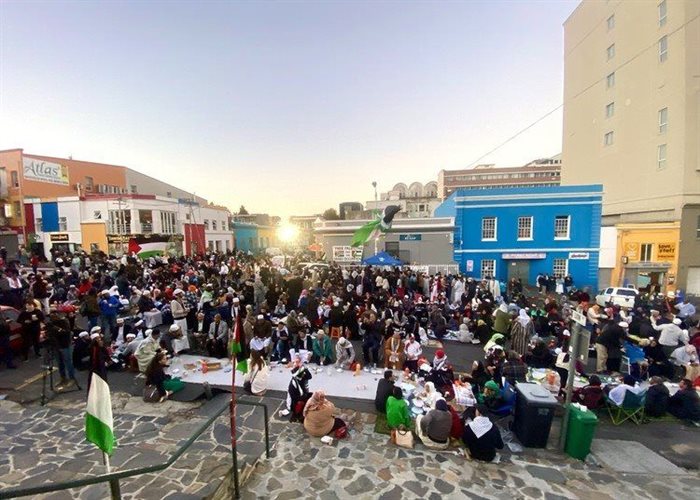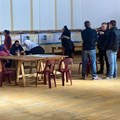Despite complaints from opposition councillors and civil society that the City of Cape Town failed to meet its public participation obligations, new development plans for Bo-Kaap and District Six were passed by a majority DA vote in council on Wednesday, 31 May.

Bo-Kaap residents, who have raised concerns over lack of public participation in the City of Cape Town’s Local Spatial Development Framework for their suburb, here participate in a mass boeka (communal dinner) during Ramadan. Photo: Matthew Hirsch
The Local Spatial Development Frameworks (LSDFs) for the two suburbs were on the agenda for the full council meeting on 25 May, but councillors from the Good Party and Al Jama-ah noted the annexures detailing the required public participation process were not included in the documents before council.
This resulted in the motion for passing the LSDFs - which are documents guiding the future development and planning for the suburbs - being moved to the budget vote meeting agenda on 31 May. The DA-majority ensured the LSDFs were adopted. All the main opposition parties, Good, ANC, EFF, and Al Jama-ah, opposed the adoption on the basis of inadequate public participation, as shown in the annexure which had been omitted from the council meeting last week.
Good councillor Morne Joseph said the annexure on public participation showed some meetings were poorly attended. “There were only 20 people in one of the meetings,” said Joseph.
He said Bo-Kaap and District Six were prime land where the value was “ever-escalating” yet there had not been proper consultation.
Al Jama-ah councillor Shameemah Salie said the dates and times of the public participation meetings often clashed with people being at work or having sports on those particular days. Salie said council’s decision should have been deferred until residents had a chance to study the LSDFs.
The Bo-Kaap Civic and Ratepayers Association said they had not even received a copy of the LSDF before the council meeting last week, but only received it on 30 May, a day before it was brought before council for the second time.
There has been previous opposition to Bo-Kaap’s large developments, and Salie said residents are concerned the LSDF does not adequately address the threat of gentrification.
Bo-Kaap
Some of the opportunities for the historic suburb, as set out in the new LSDF, include economic opportunities for residents through tourism, a road surfacing management plan – including restoration of cobbled streets, a historic monument marking programme, and a traffic management plan.
Bo-Kaap Civic and Ratepayers Association chair Osman Shaboodien said they were disappointed that they were never presented with the final document prior to it being approved by council. He said that it felt like the matter was being rushed through, which “didn’t leave a good taste in the mouth”.
“We are not talking about the content here, we are saying, finish the process. They ask us for our feedback, but we never actually see the final product. It was passed with an amendment, we are hoping to study that.”
The amendment is that detailed heritage guidelines be developed and submitted to council for approval.
Shaboodien said the association would report back to the community on the issue. “We need to have a working relationship (with the city). We don’t want a situation where there is a complete breakdown within the community. It’s going to be a very sensitive issue going forward.”
In a media statement after the meeting, the city said the LSDF takes into consideration the “exceptional potential that Bo-Kaap offers in terms of tourism and economic opportunities for its residents, and quality of life for those who call this their home”.
The city stated that the LSDF focused on what Bo-Kaap could look like in the future, the local access and movement, the type of developments that should take place and their location, and the preservation of the Bo-Kaap’s unique heritage and culture.
Salie said residents had raised concerns that the LSDF did not adequately consider residents’ privacy, traffic flow, parking constraints, and increased crime. She said residents were also concerned the plan was vague concerning buildings in the area.
“The final draft needs to be discussed with those in the affected areas,” she said in Wednesday’s meeting.
Ward 77 DA councilor Francine Higham said extensive public participation took place. Higham said that the process ran from August 2021 to December of that year and was further extended by 45 days.
“The public participation process was robust, extensive and well attended, allowing for an in-depth understanding of issues and challenges in the Bo-Kaap as well as unlocking potential ideas and solutions,” she told council.
Matthew Hirsch 16 May 2023 District Six
Although the city is not directly involved in the ongoing restitution process in District Six, it is responsible for the overall planning. Some of the plans, as set out in the District Six LSDF, include New Hanover Street being developed as the spine of business and cultural activity, green areas linking the mountain and sea, improved linkages to surrounding urban areas, providing a variety of public spaces and activities, and reinstating the historic street grid and “fine grain character of old District Six”.
The city states the purpose of the District Six LSDF is to re-establish this once vibrant neighbourhood while managing urban growth and improving access to economic opportunities.
But District Six Civic Association chair Asa Salie said the association was unhappy with the public participation process, as people who were to return to District Six had not been included.
“At the point when they started (the public participation process) there were only 139 units here from the thousands of families that were ripped out of District Six by the apartheid government,” said Asa Salie.
She said while some meetings had been online, most of the returning claimants were old and could not be expected to engage online.
“They are dictating to us what they think we’d like. I’m not happy with it, it’s a box that the City of Cape Town ticked,” she said.



































